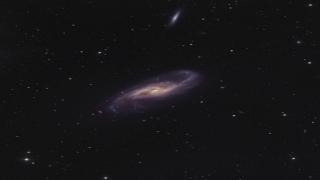Bibcode
Elvis, M.; Hao, H.; Civano, F.; Brusa, M.; Salvato, M.; Bongiorno, A.; Capak, P.; Zamorani, G.; Comastri, A.; Jahnke, K.; Lusso, E.; Mainieri, V.; Trump, J. R.; Ho, L. C.; Aussel, H.; Cappelluti, N.; Cisternas, M.; Frayer, D.; Gilli, R.; Hasinger, G.; Huchra, J. P.; Impey, C. D.; Koekemoer, A. M.; Lanzuisi, G.; Le Floc'h, E.; Lilly, S. J.; Liu, Y.; McCarthy, P.; McCracken, H. J.; Merloni, A.; Roeser, H.-J.; Sanders, D. B.; Sargent, M.; Scoville, N.; Schinnerer, E.; Schiminovich, D.; Silverman, J.; Taniguchi, Y.; Vignali, C.; Urry, C. M.; Zamojski, M. A.; Zatloukal, M.
Bibliographical reference
The Astrophysical Journal, Volume 759, Issue 1, article id. 6, 20pp, (2012).
Advertised on:
11
2012
Journal
Citations
70
Refereed citations
66
Description
The "Cosmic Evolution Survey" (COSMOS) enables the study of the spectral
energy distributions (SEDs) of active galactic nuclei (AGNs) because of
the deep coverage and rich sampling of frequencies from X-ray to radio.
Here we present an SED catalog of 413 X-ray (XMM-Newton)-selected type 1
(emission line FWHM > 2000 km s–1) AGNs with
Magellan, SDSS, or VLT spectrum. The SEDs are corrected for Galactic
extinction, broad emission line contributions, constrained variability,
and host galaxy contribution. We present the mean SED and the dispersion
SEDs after the above corrections in the rest-frame 1.4 GHz to 40 keV,
and show examples of the variety of SEDs encountered. In the
near-infrared to optical (rest frame ~8 μm-4000 Å), the
photometry is complete for the whole sample and the mean SED is derived
from detections only. Reddening and host galaxy contamination could
account for a large fraction of the observed SED variety. The SEDs are
all available online.
Related projects

Spiral Galaxies: Evolution and Consequences
Our small group is well known and respected internationally for our innovative and important work on various aspects of the structure and evolution of nearby spiral galaxies. We primarily use observations at various wavelengths, exploiting synergies that allow us to answer the most pertinent questions relating to what the main properties of
Johan Hendrik
Knapen Koelstra